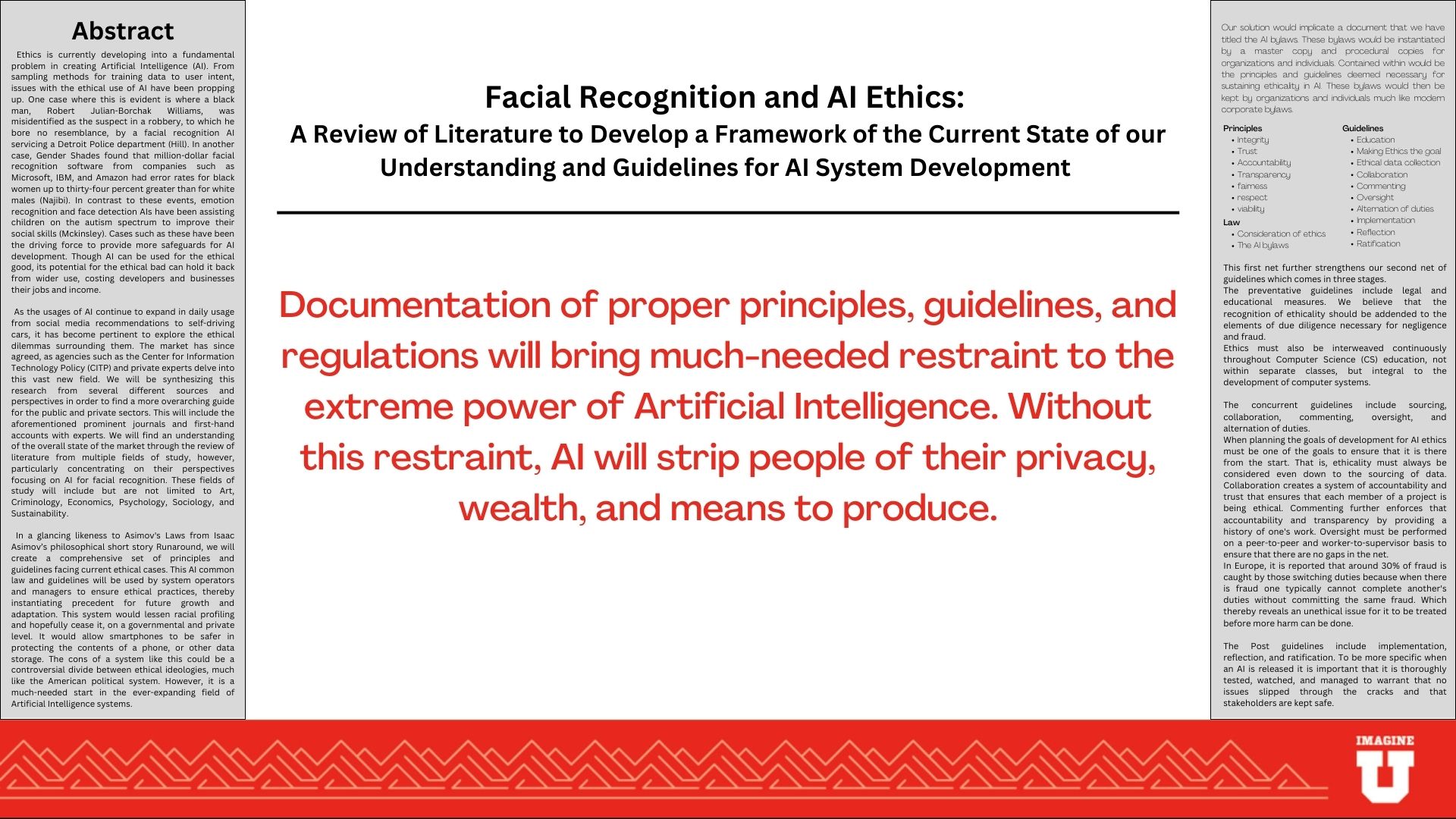Presenter Name: Isaak Grettum
Description
Ethics is currently developing into a fundamental problem in creating Artificial Intelligence (AI). From sampling methods for training data to user intent, issues with the ethical use of AI have been propping up. One such case is one in which a black man, Robert Julian-Borchak Williams, was misidentified as the suspect in a robbery, to which he bore no resemblance, by a facial recognition AI servicing a Detroit Police department (Hill). In another case, Gender Shades found that million-dollar facial recognition software from companies such as Microsoft, IBM, and Amazon had error rates for black females up to thirty-four percent greater than for white males (Najibi). In contrast to these events, emotion recognition and face detection AIs have been assisting children on the autism spectrum to improve their social skills (""Applying AI for social good""). Cases such as these have been the driving force to provide more safeguards for AI development. Though AI can be used for the ethical good, its potential for the ethical bad can hold it back from wider use, costing developers and businesses their jobs and income.
As the usages of AI continue to expand in daily usage from social media recommendations to self-driving cars, it has become pertinent to explore the ethical dilemmas surrounding them. The market has since agreed, as agencies such as the Center for Information Technology Policy (CITP) and private experts delve into this vast new field. We will be synthesizing this research from several different sources & perspectives in order to find a more overarching guide for the public & private sectors. This will include the aforementioned prominent journals and first-hand accounts with experts. We will find an understanding of the overall state of the market through the review of literature from multiple fields of study, however, particularly concentrating on their perspectives focusing on AI for facial recognition. These fields of study will include but are not limited to psychology, economics, American Law, sociology, art, criminology, and sustainability In a glancing likeness to Asimov's Laws from Isaac Asimov's philosophical short story Runaround, We will create a comprehensive set of principles and guidelines facing current ethical cases. This AI common law and guidelines will be used by system operators & managers to ensure ethical practices, thereby instantiating precedent for future growth and adaptation. This system would lessen racial profiling and hopefully cease it, on a governmental and private level. Would allow smartphones to be safer in protecting the contents of a phone, or other data storage. The cons of a system like this could be a controversial divide between ethical ideologies, much like the American political system. However, it is a much-needed start in the ever-expanding field of Artificial Intelligence systems.
As the usages of AI continue to expand in daily usage from social media recommendations to self-driving cars, it has become pertinent to explore the ethical dilemmas surrounding them. The market has since agreed, as agencies such as the Center for Information Technology Policy (CITP) and private experts delve into this vast new field. We will be synthesizing this research from several different sources & perspectives in order to find a more overarching guide for the public & private sectors. This will include the aforementioned prominent journals and first-hand accounts with experts. We will find an understanding of the overall state of the market through the review of literature from multiple fields of study, however, particularly concentrating on their perspectives focusing on AI for facial recognition. These fields of study will include but are not limited to psychology, economics, American Law, sociology, art, criminology, and sustainability In a glancing likeness to Asimov's Laws from Isaac Asimov's philosophical short story Runaround, We will create a comprehensive set of principles and guidelines facing current ethical cases. This AI common law and guidelines will be used by system operators & managers to ensure ethical practices, thereby instantiating precedent for future growth and adaptation. This system would lessen racial profiling and hopefully cease it, on a governmental and private level. Would allow smartphones to be safer in protecting the contents of a phone, or other data storage. The cons of a system like this could be a controversial divide between ethical ideologies, much like the American political system. However, it is a much-needed start in the ever-expanding field of Artificial Intelligence systems.
University / Institution: University of Utah
Type: Poster
Format: In Person
Presentation #C72
SESSION C (1:45-3:15PM)
Area of Research: Business
Email: isaak.grettum@gmail.com
Faculty Mentor: Sankar Srinivasan

